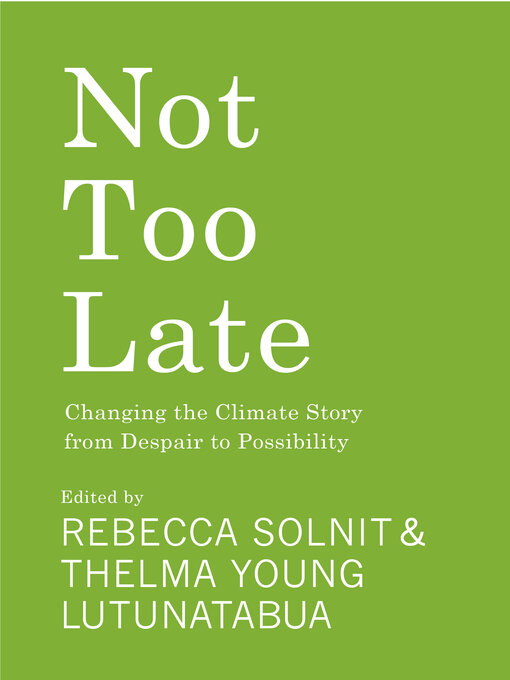
## Metadata
- Author: [[Rebecca Solnit]]
- Full Title: Not Too Late
- Category: #books
## Highlights
- To hope is to accept despair as an emotion but not as an analysis. To recognize that what is unlikely is possible, just as what is likely is not inevitable. To understand that difficult is not the same as impossible. To plan and to accept that the unexpected often disrupts plans—for the better and for the worse. To know the powerful have their weaknesses, and we who are supposed to be weak have great power together, power to change the world, have done so before and will again. To know that the future will be what we make of it in the present. To know that joy can appear in the midst of crisis, and that a crisis is a crossroads
- Frameworks matter, too, and many of them are traps. Capitalism encourages us to imagine ourselves as consumers rather than citizens; authorities like us to believe we have no power. These perspectives leave us few options but to modulate our consumption— to change nothing but ourselves and merely implore the powerful to heed our wishes. They privatize our public spirits. We need to remember our own heroic nature, our capacity for courage, compassion, and action, to remember those who came before us who took action against the odds and sometimes won. Even when they didn’t, they inspired others at the time or long after to live by principle rather than by merely what is possible. Often, they changed what is possible, in part by refusing to accept what were supposed to be the limits
- The poet and noted ornithologist J. Drew Lanham aptly said, “Joy is the justice we give ourselves.”
- I think the age of oil will come to an end, and it will either come to an end as the human species is so overwhelmed— just focused on getting through one crisis or another—that we can no longer produce or consume oil. Or it will end because of a managed decline—the intentional policies that make it possible to move as quickly as possible off of fossil fuels, with policies that we already know that will make our lives healthier, more sustainable, more equitable, more just. We rapidly implement those policies and bring fossil fuels to an end. Or we let fossil fuels end us.
- In his Letter from Birmingham Jail, Martin Luther King Jr., writes: “Injustice anywhere is a threat to justice everywhere. We are caught in an inescapable network of mutuality, tied in a single garment of destiny. Whatever affects one directly, affects all indirectly.”
- Capitalistic values have promoted individualistic mindsets and made us believe our resources are finite and competitive. But that doesn’t have to be our reality. We have the power to tap into abundance and collaboration. It’s our collective responsibility to envision and create the world we want together. We need bold, sustainable solutions that benefit many, not just the few
- Community leadership isn’t about having it all figured out, it’s about the creative spirit, it’s about the dream, it’s about the solutions created together through collaboration. Not a single sector can solve climate change alone, whether government, media, civil society, or industry. We need to center the values of community, care, and collaboration
- There’s space to dream and create new models of living and relating to each other: inspired by Indigenous wisdom, motivated by people of color’s community values, and catalyzed by feminine commitments. It’s audacious and it requires tenacity to have a vision for a world we cannot materially see. It takes courage to challenge old ways and build a better future. And it requires love, the source of transformational power—love for ourselves, our people, and the places we call home